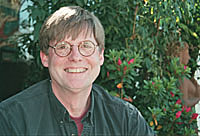![[Currents header graphic]](/homeart/currents_header.gif)
![[Currents header graphic]](/homeart/currents_header.gif)
May 3, 1999
One Thanksgiving during Bill Dickinson's student years at UCSC, the provost of Cowell College invited him to spend the holiday at his house on campus.

|
|
Bill Dickinson Photo: Francine Tyler |
The provost's house was empty and the fridge was full, and Dickinson (Cowell '68) vividly recalls how he wandered through Page and Eloise Pickard Smith's house, spellbound by the walls of books and the colorful abundance of artwork.
Lending him their house on campus was one among many small kindnesses that the Smiths extended to Dickinson, who as a former foster child, had no home to return to when UCSC closed for the holidays.
Nearly three decades later, Dickinson laughs warmly as he remembers the impression the house made on him: "I could have taken ten classes and they never would have taught me as much about how life could look."
In gratitude to the Smiths and to help other foster children shoulder the cost of a UCSC education, Dickinson has pledged a total of $100,000 over his lifetime to create the Page and Eloise Pickard Smith Memorial Scholarship.
The scholarship, in the amount of $4,000 annually, is designed to help pay for the required fees ($4,355 in 1998-99) and other expenses that students must pay to attend UCSC. Students from Cowell College who are foster children, wards of the court, or orphans receive first preference.
Dickinson hopes that other alumni and friends of the campus will join him in funding the scholarship, so that an award can be given to more than one student. Each year, 35 to 40 UCSC students self-identify as foster children, wards of the court, or orphans.
In addition, Dickinson wants to use the scholarship to encourage people to get involved in nonmonetary ways with these students. People can invite them into their homes, talk to them about jobs, or mentor them in some other way, he suggests.
"Anyone who has the survival skills necessary to help them overcome those backgrounds and arrive at a place like UCSC has real possibilities," said Dickinson. "A lot of people don't realize how little it would take to make a major difference in the life of a foster kid."
Dickinson's own family disintegrated when he was six years old, when his father left and his mother was committed to a mental institution. Dickinson and his three siblings first went to an orphanage and then were split up into separate foster homes. Dickinson bounced between the orphanage and various foster homes for nearly a decade.
"When you're in someone else's home, you have second-class status," said Dickinson, who remembers the foster homes he stayed in as "mostly crummy places with poorly educated people with a mean view of life." The kinds of people who sheltered him, Dickinson said, "took in kids because their flimsy little welfare check represented income for them."
After briefly living with his mother again at the age of 15, Dickinson supported himself in Santa Rosa, where he finished high school and two years of junior college. He transferred to UCSC as a junior in 1965, starting work at the Admissions Office one month before the campus opened to its first class of students.
Approximately 650 entered UCSC that first year. "It was an awesome, awesome time," Dickinson said, remembering the trailers students lived in, the muddy roads--and the faculty who took time out from teaching to get to know their students individually, counsel them, and spend leisure time with them.
"It was the decisive turning point in my life," he said. "Suddenly, there were all these smart people. They paid attention to me, and they expected me to be somebody."
Dickinson had always considered himself to be a bad writer because before UCSC, teachers had always written things like "awkward" in the margins of his papers. At UCSC, he gained confidence as his professors, especially Jasper Rose, taught him to use his own voice in his writing.
After graduating with a bachelor's degree in philosophy and earning a master's degree in writing at San Francisco State University, Dickinson taught English at Cabrillo College. He now owns his own business in Maine, writing marketing materials and corporate newsletters.
In the near future, Dickinson hopes to help open a new home in Boston for Boys Hope Girls Hope, a nonprofit organization that operates homes for children in 14 U.S. cities and internationally. The homes serve children who are at risk but show a high potential to succeed, providing them with adult relationships, education, and financial help.
"It's basically what happened to me when I came to UCSC--taking somebody who's got real potential and putting them in a nice environment where they can blossom," Dickinson said.
For more information about the Page and Eloise Smith Scholarship or to make a donation, call Adrienne Harrell, director of development for Student Affairs and the colleges, at (831) 459-4749 or send e-mail to harrell@cats.ucsc.edu. Bill Dickinson can also be reached at (207) 253-1816 or via e-mail at wcdcamb@aol.com.